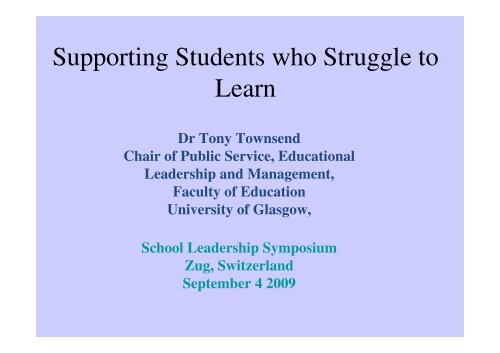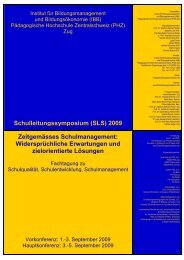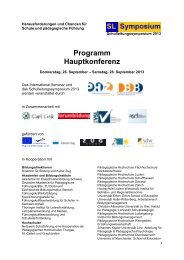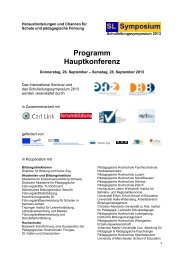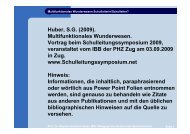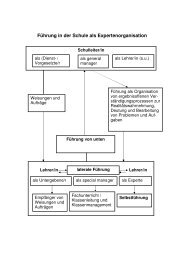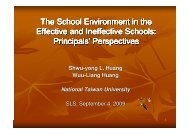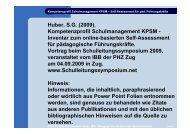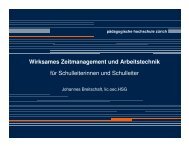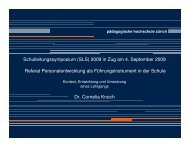Supporting Students who Struggle to Learn - Schulleitungssymposium
Supporting Students who Struggle to Learn - Schulleitungssymposium
Supporting Students who Struggle to Learn - Schulleitungssymposium
You also want an ePaper? Increase the reach of your titles
YUMPU automatically turns print PDFs into web optimized ePapers that Google loves.
<strong>Supporting</strong> <strong>Students</strong> <strong>who</strong> <strong>Struggle</strong> <strong>to</strong><br />
<strong>Learn</strong><br />
Dr Tony Townsend<br />
Chair of Public Service, Educational<br />
Leadership and Management,<br />
Faculty of Education<br />
University of Glasgow,<br />
School Leadership Symposium<br />
Zug, Switzerland<br />
September 4 2009
Question for <strong>to</strong>day…<br />
Where is the ONE PLACE in school where<br />
learning happens?<br />
Not one of the places, or even the most<br />
important place, but the one place?
Thinking and Acting Globally and Locally<br />
Thinking Globally and Acting Locally<br />
Thinking Nationally and Acting Locally<br />
1980s-2010<br />
1970s-2000s<br />
Thinking and Acting Locally<br />
1870s-1990s<br />
2000 BC- 1890s<br />
Thinking and Acting Individually
The S-curve summary<br />
Period<br />
Focus of<br />
delivery<br />
Those effectively<br />
educated<br />
Dominant Paradigm of the<br />
age<br />
000-1890 AD Individual Few People Thinking and acting<br />
individually<br />
1870-1990 AD Local Some people Thinking and acting locally<br />
1970-2000 AD National Many People Thinking nationally and<br />
acting locally<br />
1980-2010 AD International Most People Thinking globally and<br />
acting locally<br />
2010-onwards Global All people individually<br />
considered<br />
Thinking and acting both<br />
locally and globally
Research Evidence<br />
Prof John Hattie (Uni Auckland):<br />
Meta-analysis of over 50,000 studies<br />
What are the effect sizes of various aspects of student<br />
learning? What are the most important things we can do <strong>to</strong><br />
change student learning?<br />
• Reference: Hattie, J. (2003). ‘Teachers Make a Difference: What is the<br />
Research Evidence?’,<br />
http://www.leadspace.govt.nz/leadership/articles/teachers-make-adifference.php
Note on Effect Size<br />
• Effect size (ES) is a name given <strong>to</strong> a family of indices that measure<br />
the magnitude of the impact something has on something else.<br />
Unlike significance tests, these indices are independent of sample<br />
size. They are used in meta-analysis studies <strong>to</strong> summarize the<br />
findings from a specific area of research.<br />
• The larger the ES, the greater the influence of the intervention<br />
effect.<br />
• For student learning, an ES of 1.0 indicates an increase of one<br />
standard deviation on achievement, typically advancing student<br />
achievement by 2-3 years or about 50% (see Hattie, 2009: chapter<br />
2). We need <strong>to</strong> set the bar at about 0.4 at which point we start <strong>to</strong> see<br />
real difference<br />
• However we also need <strong>to</strong> consider variance – it won’t be 0.4 for<br />
every student<br />
• We also need <strong>to</strong> think about how various interventions work<br />
<strong>to</strong>gether, or not.<br />
7
Influences on Student Achievement<br />
Influence Effect Size Source<br />
Feedback 1.13 Teacher<br />
Student’s Prior Cognitive Ability 1.04 Student<br />
Instructional Quality 1.00 Large Teacher<br />
Direct Instruction .82 Teacher<br />
Remediation/feedback .65 Teacher<br />
Student’s disposition <strong>to</strong> learn .61 Student
Influences on Student Achievement<br />
Influence Effect Size Source<br />
Class environment .56 Teacher<br />
Challenge of goals .52 Teacher<br />
Peer tu<strong>to</strong>ring .50 Teacher<br />
Mastery learning .50 Teacher<br />
Parent involvement .46 Home<br />
Homework .43 Teacher<br />
Teacher style .42 Teacher<br />
Questioning .41 Moderate Teacher<br />
Peer effects .38 Peers<br />
Advance organisers .37 Teacher<br />
Simulations and games .34 Teacher<br />
Computer-assisted instruction .31 Teacher<br />
Testing .30 Teacher<br />
Instructional media .30 Teacher<br />
Aims and policy of school .24 School<br />
Affective attributes of students .24 Student
Influences on Student Achievement<br />
Influence Effect Size Source<br />
Programmed instruction .18 Teacher<br />
Ability grouping .18 School<br />
Audio-visual aids .16 Small/Weak Teacher<br />
Individualisation .14 Teacher<br />
Finances/money .12 School<br />
Behavioural objectives .12 Teacher<br />
Team teaching .06 Teacher<br />
Physical attributes (class size) -.05 School<br />
Television -.12 None/negative Home<br />
Retention -.15 School<br />
See also:<br />
Hattie, J. (2007). ‘Developing Potentials for <strong>Learn</strong>ing: Evidence, assessment, and progress’,<br />
EARLI Biennial Conference, Budapest, Hungary.<br />
http://www.education.auckland.ac.nz/uoa/education/staff/j.hattie/j.hattie_home.cfm
Activa<strong>to</strong>r or Facilita<strong>to</strong>r ?<br />
An Activa<strong>to</strong>r ES A Facilita<strong>to</strong>r ES<br />
Reciprocal teaching .74 Simulations and gaming .32<br />
Feedback .72 Inquiry based teaching .31<br />
Teaching students self-verbalization .67 Smaller class sizes .21<br />
Meta-cognition strategies .67 Individualized instruction .20<br />
Direct Instruction .59 Problem-based learning .15<br />
Mastery learning .57 Different teaching for boys & girls .12<br />
Goals - challenging .56 Web-based learning .09<br />
Frequent/ Effects of testing .46 Whole Language Reading .06<br />
Behavioral organizers .41 Inductive teaching .06<br />
ACTIVATOR .60 FACILITATOR .17
Hattie (2003):<br />
What Helps <strong>Students</strong> <strong>Learn</strong>?<br />
It is what teachers know, do, and care<br />
about which is very powerful in this<br />
learning equation.<br />
12
It’s the Teacher …<br />
‘... the most important fac<strong>to</strong>r affecting student<br />
learning is the teacher. ... The immediate and<br />
clear implication of this finding is that<br />
seemingly more can be done <strong>to</strong> improve<br />
education by improving the effectiveness of<br />
teachers than by any other single fac<strong>to</strong>r’.<br />
Wright, S.; Horn, S. & Sanders, W. (1997). 'Teacher and<br />
Classroom Context Effects on Student Achievement:<br />
Implications for Teacher Evaluation', Journal of Personnel<br />
Evaluation in Education, 11, pp. 57-67.
School and Class Effects<br />
Percent of Variance in Value-Added Measures of English and<br />
Mathematics Achievement Accounted for by School and Class<br />
Effects<br />
English<br />
Class (%) School (%)<br />
Primary 45 9<br />
Secondary 38 7<br />
Mathematics<br />
Primary 55 4<br />
Secondary 53 8<br />
Peter Hill, 1997: 9
What Helps <strong>Students</strong> <strong>Learn</strong>?<br />
Wang, M.C., Haertel, G.D. and Walberg, H.J. (1993/1994,<br />
Educational Leadership, pp 74-79)<br />
Analyzed 179 chapters, conducted 91 research<br />
syntheses, interviewed 61 educational researchers,<br />
considered 11,000 findings. Identified 28 areas<br />
grouped in<strong>to</strong> 6 categories
What Helps <strong>Students</strong> <strong>Learn</strong>?<br />
1. Classroom Management<br />
2. Metacognitive processes<br />
3. Cognitive processes<br />
4. Home Environment/Parental<br />
Support<br />
5. Student/Teacher social interactions<br />
6. Social/behavioural attributes<br />
7. Motivational/Affective attributes<br />
8. Peer Group<br />
9. Quantity of Instruction<br />
10. School Culture<br />
11. Classroom Climate<br />
12. Classroom Instruction<br />
13. Curriculum Design<br />
14. Academic Interactions<br />
15. Classroom Assessment<br />
16. Community Influences<br />
17. Psychomo<strong>to</strong>r skills<br />
18. Teacher/Administra<strong>to</strong>r<br />
Decision Making<br />
20. Parent Involvement Policy<br />
21. Classroom Implementation<br />
and Support<br />
22. Student demographics<br />
23. Out of Class Time<br />
24. Program Demographics<br />
25. School Demographics<br />
26. State Level Policies<br />
27. School Policies<br />
28. District Demographics
What Helps <strong>Students</strong> <strong>Learn</strong>?<br />
Student Aptitude 54.7<br />
Classroom Instruction/Climate 53.3<br />
Context 51.4<br />
Program Design 47.3<br />
School Organisation 45.1<br />
State/District Characteristics 35.0
The Effects of Quality Teaching:<br />
accounting for variance in student achievement<br />
( Findings from meta-analytic research)<br />
Teachers<br />
> 30%<br />
<strong>Students</strong><br />
~50%<br />
Home<br />
Peers<br />
Schools<br />
Principal<br />
~5-10%<br />
~5-10%<br />
John Hattie ( 2003, 2007)
What helps students learn?<br />
district/system<br />
school<br />
program<br />
home/community<br />
classroom<br />
student
What helps students learn?<br />
1. Classroom Management<br />
2. Metacognitive processes<br />
3. Cognitive Processes<br />
4. Home environment/parental support<br />
5. Student/Teacher social interactions<br />
Wang, Haertel & Walberg, 1993
What helps students learn?<br />
1. The curriculum and how it is presented, the<br />
classroom and how it is managed<br />
2. The ability of the student <strong>to</strong> think and <strong>to</strong> decide<br />
what they think about<br />
3. The relationships that are established between<br />
the teacher and the student, the parent and the<br />
student, the parent and the teacher and the student<br />
and learning
Curriculum<br />
Thinking Globally<br />
Recognition that in<br />
the international<br />
market, students<br />
need <strong>to</strong> have high<br />
levels of education<br />
in order <strong>to</strong> be<br />
successfully<br />
employed. All<br />
students should<br />
complete a full<br />
school program.<br />
Acting Locally<br />
Strong focus on<br />
those elements of<br />
curriculum<br />
associated with<br />
preparing them for<br />
further education,<br />
including the basic<br />
skills and a set of<br />
socially acceptable<br />
values.<br />
Thinking and Acting<br />
Locally and Globally<br />
Recognition that not all<br />
students will go on <strong>to</strong><br />
university and that other<br />
skills are necessary for<br />
those that will not. As<br />
well as the academic<br />
program, schools will<br />
cater for those <strong>who</strong> wish<br />
<strong>to</strong> go in<strong>to</strong> the world of<br />
work or other types of<br />
activity.
The Global Classroom<br />
Townsend and Otero, 1999, Hawker Brownlow, Australia
The Four Pillars of the Global<br />
Classroom<br />
• Education for Survival<br />
• Understanding our place in the world<br />
• Understanding community<br />
• Understanding our personal<br />
responsibility
The Global Classroom<br />
Education for Survival<br />
• Literacy and Numeracy<br />
• Technological Capabilities<br />
• Communication Skills<br />
• Development Capability<br />
• Awareness of one’s choices<br />
• Critical Thinking Skills and Problem Solving<br />
• Decision Making<br />
• Healthy optimism*<br />
Townsend and Otero, 1999
The Global Classroom<br />
Understanding our Place in the World<br />
• Exchange of Ideas<br />
• Work Experience and Entrepreneurship<br />
• Awareness and Appreciation of Cultures<br />
• Creative Capability<br />
• Vision, Adaptability and Open Mindedness<br />
• Social, Emotional and Physical Development<br />
• Development of Student Assets<br />
• Managing Anxiety*<br />
Townsend and Otero, 1999
The Global Classroom<br />
Understanding Community<br />
• Teamwork capability<br />
• Citizenship Studies<br />
• Community Service<br />
• Community Education<br />
• Global Awareness and Education<br />
• Goal Setting*<br />
Townsend and Otero, 1999
The Global Classroom<br />
Understanding Our Personal Responsibility<br />
• Commitment <strong>to</strong> Personal Growth<br />
through lifelong learning<br />
• Development of Personal Value System<br />
• Leadership capabilities<br />
• Commitment <strong>to</strong> community and global<br />
development<br />
• Commitment <strong>to</strong> personal and community<br />
health<br />
• Self-management*<br />
Townsend and Otero, 1999
Pedagogy<br />
Thinking Globally<br />
Classroom<br />
effectiveness is more<br />
important than<br />
school effectiveness<br />
when it comes <strong>to</strong><br />
student achievement.<br />
Better qualified and<br />
more committed<br />
teachers lead <strong>to</strong><br />
higher levels of<br />
student achievement.<br />
Acting Locally<br />
Strong focus on<br />
teaching <strong>to</strong> the test,<br />
especially for<br />
students <strong>who</strong> are<br />
struggling. Most<br />
teacher professional<br />
development<br />
focuses on basic<br />
skills and ‘proven<br />
techniques’ of<br />
imparting them.<br />
Thinking and Acting<br />
Locally and Globally<br />
Recognition that a recipe<br />
approach <strong>to</strong> teaching will<br />
not lead <strong>to</strong> success for all<br />
students. Teachers are<br />
given the skills <strong>to</strong> build<br />
strong relationships with<br />
students and making the<br />
curriculum relevant<br />
through a variety of<br />
different teaching<br />
techniques.
The Relationa<strong>Learn</strong>ing Model (Otero and Sparks, 2000)<br />
Isolated <strong>Learn</strong>ers<br />
RECOGNISING<br />
Awareness<br />
Facts for Forgetting
The Relationa<strong>Learn</strong>ing Model (Otero and Sparks, 2000)<br />
Engaged <strong>Learn</strong>ers<br />
Isolated <strong>Learn</strong>ers<br />
UNDERSTANDING<br />
Adaptability<br />
Concepts for Analyzing<br />
RECOGNISING<br />
Awareness<br />
Facts for Forgetting
The Relationa<strong>Learn</strong>ing Model (Otero and Sparks, 2000)<br />
Interactive/Introspective<br />
<strong>Learn</strong>ers<br />
Engaged <strong>Learn</strong>ers<br />
Isolated <strong>Learn</strong>ers<br />
VALUING<br />
Interaction<br />
Ethics for Discussion<br />
UNDERSTANDING<br />
Adaptability<br />
Concepts for Analyzing<br />
RECOGNISING<br />
Awareness<br />
Facts for Forgetting
The Relationa<strong>Learn</strong>ing Model (Otero and Sparks, 2000)<br />
Global Self-regulated<br />
<strong>Learn</strong>ers<br />
RELATING<br />
Interdependence<br />
Options for Positive Action<br />
Interactive/Introspective<br />
<strong>Learn</strong>ers<br />
Engaged <strong>Learn</strong>ers<br />
Isolated <strong>Learn</strong>ers<br />
VALUING<br />
Interaction<br />
Ethics for Discussion<br />
UNDERSTANDING<br />
Adaptability<br />
Concepts for Analyzing<br />
RECOGNISING<br />
Awareness<br />
Facts for Forgetting
Assessment<br />
Thinking Globally<br />
Recognition that<br />
being internationally<br />
competitive involves<br />
understanding how<br />
well students are<br />
learning in<br />
comparison <strong>to</strong><br />
others, both locally<br />
and globally.<br />
Acting Locally<br />
Strong focus on<br />
those elements of<br />
the curriculum that<br />
are easily measured<br />
and are likely <strong>to</strong> be<br />
part of an<br />
international testing<br />
program. This has<br />
led <strong>to</strong> a higher<br />
values being given<br />
<strong>to</strong> some subjects<br />
than <strong>to</strong> others.<br />
Thinking and Acting<br />
Locally and Globally<br />
Recognition that <strong>to</strong> be a<br />
fully functioning human<br />
being takes more than a<br />
particular score on a<br />
standardized test. As well<br />
as ‘valuing what we<br />
measure’ steps are take <strong>to</strong><br />
ensure that we learn <strong>to</strong><br />
measure other human<br />
skills that are equally<br />
valued.
Sorting <strong>Students</strong><br />
Student Population<br />
VERY<br />
DUMB<br />
SORTA<br />
DUMB<br />
SORTA<br />
SMART<br />
VERY<br />
SMART<br />
Student Smartness
Serving <strong>Students</strong><br />
A - Advanced<br />
P - Proficient<br />
NI - Needs Improvement<br />
W - Warning
Perception<br />
Our view of the world is a product of what<br />
we are looking at, where we are standing<br />
when we are looking at it and how we feel<br />
about ourselves and the thing we are<br />
looking at.
FABULOUS FILES ARE<br />
FREQUENTLY THE RESULT<br />
OF YEARS OF SCIENTIFIC<br />
STUDY FOLLOWED BY THE<br />
KEEPING OF FULL<br />
FINDINGS.
FABULOUS FILES ARE<br />
FREQUENTLY THE RESULT<br />
OF YEARS OF SCIENTIFIC<br />
STUDY FOLLOWED BY THE<br />
KEEPING OF FULL<br />
FINDINGS.
Perception<br />
Our view of the world is a product of what<br />
we are looking at, where we are standing<br />
when we are looking at it and how we feel<br />
about ourselves and the thing we are<br />
looking at.<br />
We can, however, change people’s<br />
perceptions of the world by providing them<br />
with new information, by educating them.
A true s<strong>to</strong>ry<br />
Ricky has been diagnosed earlier this year as a<br />
dysfunctional agoraphobic. He could not travel<br />
in a car, could not go <strong>to</strong> shopping centers,<br />
terrified of the school - especially the students,<br />
could not see friends (in fact he lost all contact<br />
with his friends).
A true s<strong>to</strong>ry<br />
He could not cope with visi<strong>to</strong>rs in the house, he<br />
could not step outside the front or back door, and<br />
sometimes he could only briefly leave the<br />
confines of his bedroom. He would not get <strong>to</strong><br />
sleep until around 4am. He was also losing his<br />
ability <strong>to</strong> speak and listen and had <strong>to</strong> be retaught<br />
<strong>to</strong> do both.
A true s<strong>to</strong>ry<br />
No-one seemed <strong>to</strong> be able <strong>to</strong> help him. He had<br />
been <strong>to</strong> GPs, neurologists, psychologists,<br />
physios, pediatrician, teachers, school<br />
counsellor. We even saw the Principal twice.<br />
No-one could seem <strong>to</strong> find the answers.
A true s<strong>to</strong>ry<br />
Finally, in desperation, I asked how I could<br />
contact Randall Clinch. After spending<br />
approximately one hour with Randall, something<br />
miraculous happened. I cannot explain what<br />
happened in his presence, but our lives changed<br />
instantly.
A true s<strong>to</strong>ry<br />
Within two days Ricky walked out our front<br />
door and joined a remote control flying club,<br />
where two of his schools friends fly. He now<br />
flies with instruc<strong>to</strong>rs and finds no effort in<br />
making conversation with other members. He<br />
has never had a day of depression since seeing<br />
Randall.
A true s<strong>to</strong>ry<br />
When you think of all the list of professionals<br />
<strong>who</strong> tried <strong>to</strong> help Ricky and some tried, some<br />
didn’t, some were cruel and some were<br />
compassionate, but the agoraphobia outsmarted<br />
all these qualifications every time.
A true s<strong>to</strong>ry<br />
How does anyone justify Randall Clinch and his<br />
program? How can something so simple and so<br />
logical actually work? If ever anyone doubted<br />
him, I hope Ricky’s s<strong>to</strong>ry will make the skeptics<br />
realise this is the only thing that saved him.
Other s<strong>to</strong>ries<br />
For other s<strong>to</strong>ries about how Randall Clinch has<br />
impacted on young people in trouble, see his<br />
website<br />
www.Randallclinch.com
What is my concept of school?<br />
Struggling students<br />
Thing<br />
dunnow<br />
drive through<br />
brainwash centre<br />
drive through office<br />
Sh*t<br />
Successful students<br />
Safe environment <strong>to</strong> learn<br />
and gain new skills<br />
Somewhere where you<br />
learn and make friends<br />
where students learn how<br />
<strong>to</strong> survive<br />
a piece of beeeep
What is my concept of teacher?<br />
Thing<br />
Struggling students<br />
dunnow<br />
hate them all<br />
some are good some aren’t<br />
teachers are here <strong>to</strong> teach<br />
us not scream at the class<br />
Successful students<br />
To teach and be a men<strong>to</strong>r<br />
Someone <strong>who</strong> teaches<br />
you different things<br />
Helps you with<br />
knowledge<br />
Someone <strong>who</strong> respects<br />
students
What is my concept of student?<br />
Thing<br />
Struggling students<br />
Dunnow<br />
<strong>Students</strong> should learn<br />
what they need not all<br />
this cr*p<br />
A well mannered kid<br />
(not bloody likely)<br />
Successful students<br />
To learn and put effort in<br />
Someone <strong>who</strong> learns<br />
what the teacher is<br />
teaching<br />
People <strong>who</strong> would like <strong>to</strong><br />
learn - can be any age<br />
Someone <strong>who</strong> respects<br />
other students and<br />
teachers
What is my concept of learning?<br />
Struggling students<br />
Thing<br />
dunnow<br />
a piece of rubbish that<br />
the government can<br />
stick up their ….<br />
getting work stuck in<br />
your head<br />
there is no learning<br />
Successful students<br />
To take in everything and<br />
put it in<strong>to</strong> my life<br />
Knowing stuff in all<br />
<strong>to</strong>pics<br />
Something everyone goes<br />
through every day<br />
To get smarter
What is my concept of my future?<br />
Struggling students<br />
Thing<br />
a better one if I leave<br />
this hole in year 10<br />
cr*p<br />
If I continue <strong>to</strong> go <strong>to</strong><br />
this school I won’t<br />
have a future<br />
Successful students<br />
To go <strong>to</strong> university and<br />
study medicine<br />
Determined by how much<br />
I learn at school<br />
Good job, great family<br />
I don’t have a future
What is my concept of myself?<br />
Struggling students<br />
Thing<br />
dunnow<br />
I failed<br />
I can learn<br />
I don’t know<br />
Successful students<br />
Willing <strong>to</strong> learn and take<br />
everything in<br />
I am a good and nice<br />
person, sensible, smart,<br />
clever<br />
I am OK<br />
A balanced girl 50%<br />
good – 50% bad
Randall Clinch<br />
Young people <strong>who</strong> have not learned <strong>to</strong> choose<br />
their thoughts and use their thinking skills respond<br />
<strong>to</strong> what the chaps in the <strong>to</strong>p paddock tell them <strong>to</strong><br />
do.
Cell Body
Dendrites<br />
Cell Body
Dendrites<br />
Cell Body<br />
Axon
Dendrites<br />
Cell Body<br />
Axon<br />
Terminals<br />
Axon
Electrical charge from the cell body <strong>to</strong> the tip<br />
Impulse<br />
Presynaptic axon<br />
Transmitters<br />
Synaptic gap<br />
Recep<strong>to</strong>rs<br />
Electrical charge <strong>to</strong> the cell body from the tip<br />
Postsynaptic dendrite
Dendrites<br />
Myelin Sheath<br />
Cell Body<br />
Axon<br />
Terminals<br />
Axon
Randall Clinch<br />
We need <strong>to</strong> distinguish between habitual<br />
behavior and intelligent behavior.<br />
With habitual behavior we respond <strong>to</strong> a stimulus<br />
in the same way as we have learned <strong>to</strong> respond.<br />
With intelligent behavior we reinterpret the<br />
stimulus by asking ourselves questions.
Environment interpreted by Senses
Environment interpreted by Senses<br />
External Stimulus
Environment interpreted by Senses<br />
Thoughts<br />
External Stimulus
Environment interpreted by Senses<br />
Thoughts<br />
External Stimulus<br />
Memory<br />
(The Past)
The<br />
reality for<br />
most<br />
people ’<br />
The concept of ‘Bike’
Bikes are no fun<br />
because of…<br />
The concept of ‘Bike’
Environment interpreted by Senses<br />
Thoughts<br />
External Stimulus<br />
Memory<br />
(The Past)
Environment interpreted by Senses<br />
Thoughts<br />
External Stimulus<br />
Thoughts<br />
Memory<br />
(The Past)<br />
Future)<br />
Imagination<br />
(The
The<br />
reality for<br />
most<br />
people ’<br />
The concept of ‘Bike’
Environment interpreted by Senses<br />
Thoughts<br />
External Stimulus<br />
Thoughts<br />
Memory<br />
(The Past)<br />
Future)<br />
Imagination<br />
(The
Environment interpreted by Senses<br />
Thoughts<br />
Thoughts<br />
External Stimulus<br />
Thoughts<br />
Thoughts<br />
Memory Perception Imagination<br />
(The Past)<br />
(The Present) (The<br />
Future)
Environment interpreted by Senses<br />
Thoughts<br />
Thoughts<br />
External Stimulus<br />
Thoughts<br />
Thoughts<br />
Memory Perception Imagination<br />
(The Past)<br />
(The Present) (The<br />
Future)<br />
Emotion<br />
(The Driver)
Environment interpreted by Senses<br />
Thoughts<br />
Thoughts<br />
External Stimulus<br />
Thoughts<br />
Thoughts<br />
Memory Perception Imagination<br />
(The Past)<br />
(The Present) (The<br />
Future)<br />
Emotion<br />
(The Driver)<br />
Action
Habitual avoidance behavior patterns
Randall Clinch<br />
Teachers respond <strong>to</strong> young people’s<br />
behavior and try <strong>to</strong> address the behavior. If<br />
we addressed how young people think we<br />
can engage them in learning.
Stimulus<br />
Perception<br />
Emotion<br />
Action<br />
Stimulus<br />
Perception<br />
Emotion<br />
Action<br />
Stimulus<br />
Perception<br />
Emotion<br />
Action<br />
The S<strong>to</strong>ry<br />
Stimulus<br />
Perception<br />
Emotion<br />
Action<br />
Stimulus<br />
Perception<br />
Emotion<br />
Action<br />
Stimulus<br />
Perception<br />
Emotion<br />
Action
Questions about the Environment<br />
Thoughts<br />
Thoughts<br />
Internal Stimulus<br />
Thoughts<br />
Thoughts<br />
Memory Perception Imagination<br />
(The Past)<br />
(The Present) (The Future)<br />
Emotion<br />
(The Driver)<br />
Action A different s<strong>to</strong>ry
Choosing our thoughts
The concept of ‘Bike’<br />
Bikes are<br />
good<br />
because<br />
of…<br />
’<br />
Habitual Involvement Behavior patterns
The askers and the tellers<br />
What if it is true that, as soon as our brain<br />
recognises that someone is telling us something,<br />
we respond with habitual behaviour and as soon<br />
as it recognises that someone is asking us<br />
something, we respond with intelligent<br />
behaviour?
Teacher Behaviours and Student Responses<br />
A<br />
TEACHER<br />
ASKING<br />
C<br />
B<br />
FOCUS ON<br />
CONCEPTS/<br />
PROCESSES<br />
D<br />
TEACHER<br />
SUPPORTING/<br />
INVOLVING<br />
TEACHER<br />
OPPOSING/<br />
MANAGING<br />
FOCUS ON<br />
FACTS/<br />
TASKS<br />
G<br />
E<br />
F<br />
TEACHER<br />
TELLING<br />
H
Teacher Behaviors and Student Responses<br />
Management<br />
Approach<br />
Classroom<br />
Environment<br />
Content Focus<br />
Student Response<br />
A Teacher asking Teacher supporting Focus on<br />
concepts/processes<br />
Understanding<br />
B Teacher asking Teacher supporting Focus on facts/tasks Knowledge<br />
C Teacher asking Teacher managing Focus on<br />
concepts/processes<br />
D Teacher asking Teacher managing Focus on facts/tasks Guilt<br />
E Teacher telling Teacher supporting Focus on<br />
concepts/processes<br />
Self-doubt<br />
Self-belief<br />
F Teacher telling Teacher supporting Focus on facts/tasks Clarity<br />
G Teacher telling Teacher managing Focus on<br />
concepts/processes<br />
Unquestioned belief<br />
H Teacher telling Teacher managing Focus on facts/tasks Memorization
Teacher Behaviors and Student Responses<br />
LEARNING THROUGH<br />
UNDERSTANDING<br />
B<br />
A<br />
TEACHER<br />
ASKING<br />
FOCUS ON<br />
CONCEPTS/<br />
PROCESSES<br />
D<br />
C<br />
TEACHER<br />
SUPPORTING/<br />
INVOLVING<br />
TEACHER<br />
OPPOSING/<br />
MANAGING<br />
FOCUS ON<br />
FACTS/<br />
TASKS<br />
G<br />
E<br />
F<br />
TEACHER<br />
TELLING<br />
H<br />
DEFIANT<br />
COMPLIANCE
Randall Clinch<br />
Excitement comes... Prior <strong>to</strong> the activity (increased by fear fac<strong>to</strong>r)<br />
Enjoyment comes... From doing the activity<br />
Reward comes…<br />
From completing the activity well<br />
Satisfaction comes...<br />
From knowing that you have contributed<br />
To yourself, <strong>to</strong> someone else or <strong>to</strong> something else
Randall Clinch<br />
Excitement comes... Prior <strong>to</strong> the activity (increased by fear fac<strong>to</strong>r)<br />
Boredom comes... From having <strong>to</strong> do things you don’t want <strong>to</strong> do<br />
Guilt comes…<br />
From knowing you could have done better<br />
Frustration comes...<br />
From knowing you have made no contribution
Randall Clinch<br />
A concept is...<br />
...an idea that is opinion based and experience<br />
supported. It is a living thing and can grow over<br />
time. Often the opinion is inherited.
Randall Clinch<br />
For students <strong>to</strong> be successful learners we need <strong>to</strong><br />
help them <strong>to</strong> develop five primary concepts:<br />
• a concept of learning<br />
• a concept of teacher<br />
• a concept of school<br />
• a concept of self<br />
• a concept of future
Randall Clinch<br />
The long term success a student has is not in<br />
the relationship they have with their teacher<br />
but in the relationship they have with<br />
learning.
Randall Clinch<br />
The concept of learning we need <strong>to</strong> develop<br />
is the ability <strong>to</strong> gain knowledge and the<br />
ability <strong>to</strong> do something <strong>to</strong>day I couldn’t do<br />
yesterday.
Randall Clinch<br />
The concept of teacher we need <strong>to</strong><br />
develop is someone <strong>who</strong> facilitates or<br />
shares the learning.
Randall Clinch<br />
The concept of school we need <strong>to</strong><br />
develop is that it is a place of learning.
Randall Clinch<br />
The concept of self we need <strong>to</strong> develop<br />
is that I am a good person that can<br />
learn.
Randall Clinch<br />
The concept of future we need <strong>to</strong><br />
develop is something that hasn’t<br />
happened yet, but I am looking<br />
forward <strong>to</strong>.
Attitude by Choice<br />
Attitude...<br />
… is the way we do whatever we do<br />
… often comes from the past and controls the<br />
future<br />
… is a great natural resource<br />
… makes the impossible possible<br />
… is what makes the future different from the<br />
past
The Process<br />
1. Engage the intellect
Engaging the Intellect
Engaging the Intellect<br />
What is this for you?
Engaging the Intellect<br />
Who is right?
Engaging the Intellect<br />
We all are
Engaging the Intellect
Engaging the Intellect
Engaging the Intellect
The Process<br />
1. Engage the intellect<br />
2. Explain <strong>to</strong> students how perceptions are built
Billy the <strong>Learn</strong>er<br />
MEMORY<br />
THOUGHTS<br />
PERCEPTION<br />
THOUGHTS<br />
IMAGINATION<br />
SWITCH<br />
EMOTIONS<br />
ACTIONS
The Process<br />
1. Engage the intellect<br />
2. Explain <strong>to</strong> students how perceptions are built<br />
3. Have students practice asking questions that turn<br />
on perceptions
Perception questions<br />
• What color was your first bicycle?<br />
• Do you have a pet?<br />
• What is your favorite holiday place?<br />
• What are you really good at?
The Process<br />
1. Engage the intellect<br />
2. Explain <strong>to</strong> students how perceptions are built<br />
3. Have students practice asking questions that turn<br />
on perceptions<br />
4. Work your way through a series of questions that<br />
strengthen students
Attitude by Choice<br />
• The things I like <strong>to</strong> do are….<br />
• My current or previous hobbies are...<br />
• Some of my best choices have been…<br />
• My most exciting moments have been…<br />
• My most enjoyable moments have been…<br />
• My most rewarding moments have been…<br />
• My most satisfying moments have been…<br />
• What do I love about my life?<br />
• What do I love about myself?
What we might ask<br />
At the end of each class/day at school:<br />
• What did you enjoy in class <strong>to</strong>day?<br />
• What rewarded you in class <strong>to</strong>day?<br />
• What satisfied you in class <strong>to</strong>day?<br />
• What did you contribute <strong>to</strong> class <strong>to</strong>day?
Our task as teachers<br />
For every decision we make, for every action<br />
we take, for every Euro we spend, we need <strong>to</strong><br />
have at the front of our minds….<br />
...How will this change what happens in a<br />
student’s head?
IDEALS/BELIEFS
From Effective Schools <strong>to</strong><br />
Effective Teachers<br />
Modern Teachers need <strong>to</strong> be developed as<br />
capable which is seen as moving ‘beyond’<br />
initial competencies. The Capable Teacher is<br />
what we should be seeking <strong>to</strong> develop,<br />
encourage and honour as the hallmark of our<br />
profession.<br />
Cairns, 1998: 1
Capacity<br />
Capacity building is concerned with<br />
creating the conditions, opportunities and<br />
experiences for collaboration and mutual<br />
learning<br />
Harris (2001)
Teacher Capability<br />
Capability is…<br />
having justified confidence in your ability <strong>to</strong>:<br />
• take appropriate and effective action<br />
• communicate effectively<br />
• collaborate with others<br />
• learn from experiences<br />
in changing and unfamiliar circumstances.<br />
Stephenson, 1993
Capability <strong>Learn</strong>ing Model<br />
Three intertwined elements:<br />
• Ability (describes both competence and<br />
capacity)<br />
• Values (the ideals that govern the use of<br />
ability)<br />
• Self-efficacy (the way people judge their<br />
capability <strong>to</strong> carry out actions<br />
effectively)
Leadership Issues for Capability<br />
<strong>Learn</strong>ing Model<br />
• Ability (improved by structured<br />
professional development)<br />
• Values (improved by establishing a<br />
common code of values -<br />
professionalism)<br />
• Self-efficacy (improved by providing<br />
teachers with professional support)
Nutrients for a hospitable learning<br />
culture<br />
• being valued<br />
• being encouraged<br />
• being noticed<br />
• being trusted<br />
• being listened <strong>to</strong><br />
• being respected<br />
Southworth, 2000
The way forward<br />
John Dewey was supposed <strong>to</strong> have said when<br />
asked <strong>to</strong> solve a particularly difficult<br />
educational problem, ‘Do you want the regular<br />
way or the miraculous way?’ When asked<br />
what this meant he said the regular way was<br />
for God <strong>to</strong> send angels down <strong>to</strong> every school<br />
and they would fix any problem that might<br />
come up. When asked what the miraculous<br />
way was, he responded ‘We do it ourselves’.
More information<br />
If you would like more details contact<br />
Tony Townsend:<br />
Department of Educational Studies<br />
University of Glasgow<br />
Phone: +44(0)141 330 4434<br />
Fax: +44(0)141 330 5451<br />
email:<br />
t.<strong>to</strong>wnsend@educ.gla.ac.uk


